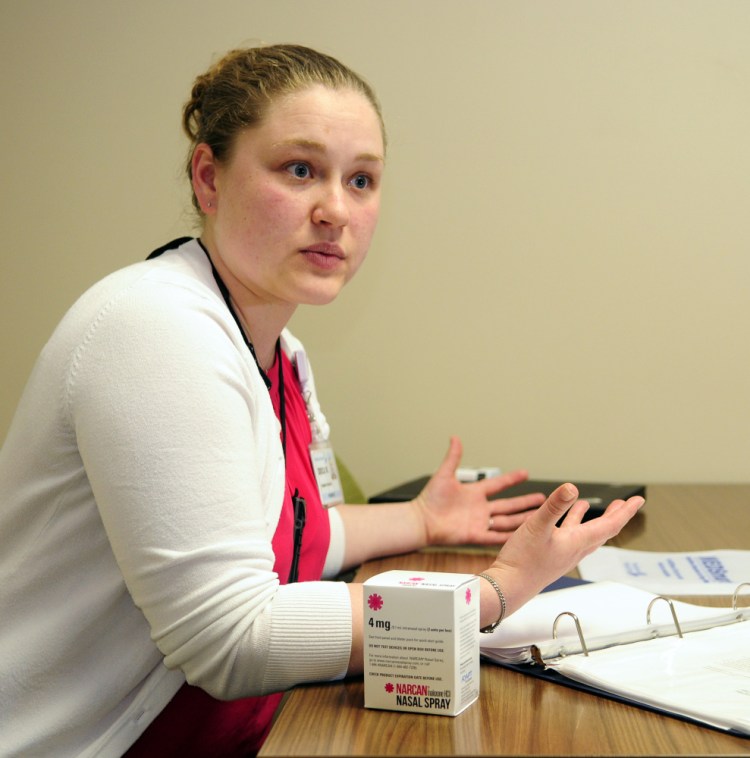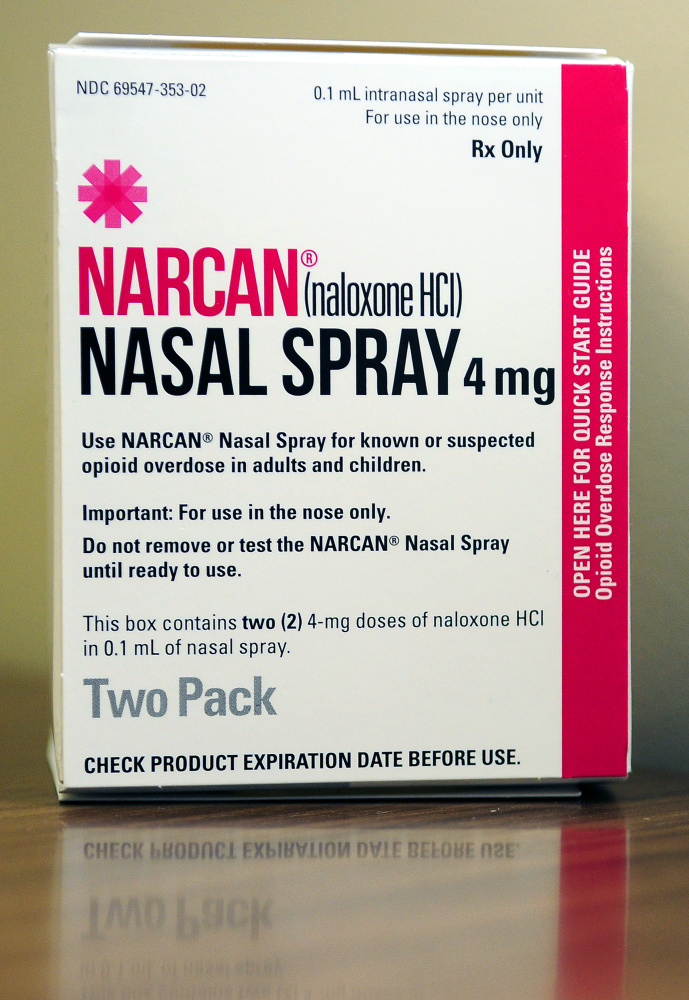A pilot program now underway at the Augusta and Waterville branches of MaineGeneral Medical Center has handed out 24 kits of a life-saving drug that reverses the chemical effect of an opioid overdose.
Narcan, also known as naloxone, has traditionally been carried by emergency medical responders and administered at the scene when people overdose on heroin and opioid painkillers. The MaineGeneral pilot program is just one of the ways the antidote has become more available in recent years in response to an addiction epidemic that shows no signs of abating.
Since April, MaineGeneral has been prescribing and handing out the kits in its emergency department using funds from a $100,000 grant that was awarded by the federal government last fall. It was one of three Maine health groups to receive the grants, which are meant to prevent opioid overdoses in rural areas.
As part of the program, emergency department nurses are also training the friends and family members of potential overdose victims how to check their breathing and administer the drug through the person’s nostrils.
“If I was overdosing, I would not be able to give myself naloxone,” said Erica Wegrzyn, a pharmacy resident at MaineGeneral who helped organize the program. “The idea we are trying to encourage, and the research that’s out there shows, by providing education — even if it’s only to the patient — we are hoping to educate the community at large.”
Overdoses rose by 31 percent in Maine in 2015, with a new high of 272 fatalities, according to data from the attorney general’s office. There were 107 deaths from heroin compared to 57 heroin deaths in 2014.
That’s led to a spike in the calls for emergency medical services.
The Augusta Fire Department, which also serves as the city’s ambulance service, used Narcan on 51 calls in 2015, more than double the 22 uses in 2014, according to data compiled by Battalion Chief Steven Leach. The department has used Narcan on 25 calls this year, including 10 in May and at least seven in June. Three overdose victims have died this year at the scene.
But with some remote Kennebec County towns at a great remove from the nearest ambulance service, first responders can’t always make it to the scene of an overdose soon enough, a fact that was illustrated during a one-week period in Monmouth last month.
Three people overdosed on heroin there in that one week. Two were rescued by medics from the Winthrop Ambulance Service who were carrying Narcan, the local police chief said, but a third required CPR and is now on life support.
That danger has led everyone from law enforcement agencies to health care providers to family members of drug users to push for their own access to Narcan as they may be able to restore the victim’s breathing before an ambulance can take them to the emergency department.
The purpose of the MaineGeneral program is to meet some of that demand, while also getting those at risk of opiate overdose into more lasting treatment opportunities.
“Brain damage begins, on average, after four minutes of not having oxygen to the brain,” Wegrzyn said. “Especially up here, we have some very rural areas. It’s very important to get that patient breathing so we prevent that brain damage from occurring.”
Under the new program, doctors and nurse practitioners in the emergency department can prescribe and hand out free Narcan kits to anyone who requests them or seem at risk of an opiate overdose.
A patient who has overdosed in the past would be identified as at-risk, according to hospital guidelines, but so would someone who takes opioids and has unrelated breathing issues, or who takes separate medications that can affect the respiratory system.
Nurses have been coaching recipients to instruct their friends and family members on how to administer naloxone, according to Wegrzyn, and also training those acquaintances directly if they happen to be at the hospital.
“We are hoping the patient can share this information with their family, reviewing information with them, so that if they get into trouble, they have someone to protect them,” she said.
Through the program, patients are also encouraged to create what Wegrzyn calls “a personalized rescue strategy.”
They’re given refrigerator magnets that instruct the acquaintances to check if the person is responding, then administer the Narcan before calling 911, to get the victim breathing as quickly as possible. There is also a space on those magnets where the patients can write the location of their Narcan kit.
Since the program started in April, Wegrzyn said she heard of one recipient who overdosed and whose life was saved with the kit, but couldn’t provide more information because of patient privacy laws.
With the grant funds received from the federal government, MaineGeneral has also worked with primary care providers in the health system and trained sheriff’s deputies in Kennebec, Waldo and Sagadahoc counties how to administer Narcan.
Timothy Pieh, medical director of emergency medicine at MaineGeneral, said the program for handing out Narcan kits is part of the hospital’s broader approach to the opiate crisis. In recent years, he said, the system has been reducing how many opioid medications it prescribes, while expanding its use of medications like Suboxone that can help people overcome their addictions.
“We don’t think of this as a treatment for them,” he said of the Narcan program. “It’s a bridge to protect them from death, and what we need to do is continue to support other efforts. There’s been a tremendous push to get our medical system ramped up. It’s just complicated, it’s difficult and it takes resources, and this is not a resource heavy time in medicine.”
Charles Eichacker — 621-5642
Twitter: @ceichacker
Send questions/comments to the editors.





Success. Please wait for the page to reload. If the page does not reload within 5 seconds, please refresh the page.
Enter your email and password to access comments.
Hi, to comment on stories you must . This profile is in addition to your subscription and website login.
Already have a commenting profile? .
Invalid username/password.
Please check your email to confirm and complete your registration.
Only subscribers are eligible to post comments. Please subscribe or login first for digital access. Here’s why.
Use the form below to reset your password. When you've submitted your account email, we will send an email with a reset code.